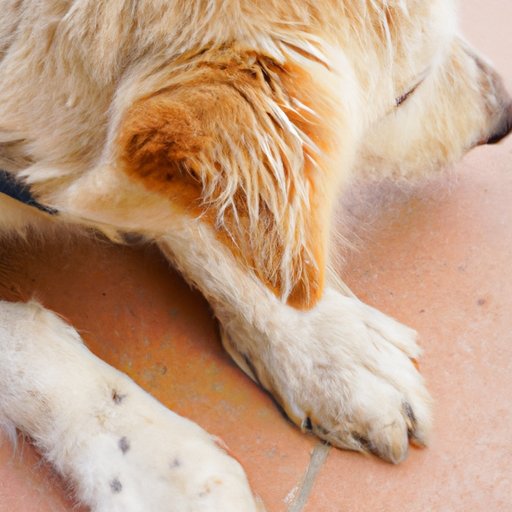
Introduction
As a responsible dog owner, you must keep an eye out for potential health problems that might affect your furry companion, such as ringworm. Don’t let the name confuse you- ringworm is a fungal infection that does not involve any actual worms. Ringworm is a highly contagious zoonotic disease, meaning it can be passed between dogs and humans, which is why early detection and treatment are crucial. This article provides a comprehensive guide on how to identify, treat, and prevent ringworm in dogs.
How to Identify and Treat Ringworm in Dogs
The early detection and treatment of ringworm in dogs can prevent the infection from spreading and causing discomfort for your pet, so it’s essential to recognize the signs and symptoms. The most common symptoms of ringworm include hair loss, flaky or scaly skin, and red, inflamed lesions on the skin. A fungal culture or skin scraping test might be necessary to confirm the diagnosis of ringworm in your dog, and once confirmed, a vet may prescribe antifungal medication to effectively treat the infection. It’s also vital to follow good hygiene practices such as wearing gloves while grooming your dog, sanitizing towels, and isolating infected animals to avoid transmission.
DIY Remedy for Ringworm in Dogs
There are various home remedies to treat ringworm in dogs, and while some might be effective, others can worsen the infection’s symptoms. One of the most popular remedies is apple cider vinegar diluted with water, as it is believed to have antifungal properties. However, it’s essential to follow the instructions carefully, avoid contact with the pet’s eyes or open wounds, and monitor the dog’s response to the remedy closely. If the home remedy is not working or appears to be causing additional symptoms, seek a veterinarian’s advice immediately.
Preventing the Spread of Ringworm in Dogs
Ringworm in dogs is caused by fungi from the Microsporum and Trichophyton species, and it’s usually transmitted by direct contact with infected animals. Pet owners must maintain good hygiene practices, such as washing their hands regularly, isolating infected pets, and avoiding contact with stray or abandoned animals when outdoors. Additionally, pet owners must disinfect the pet’s bed, grooming tools and regularly change bedding and blankets. It’s crucial to wear gloves or protective clothing while handling sick pets and dispose of contaminated materials safely.
Important Things to Know about Ringworm in Dogs
Ringworm infection in dogs is a common disease that can occur throughout the year, causing mild to severe symptoms. It’s crucial to know the causes and symptoms of ringworm in dogs so you can take preventive measures. You can prevent ringworm by practising good hygiene, avoiding contact with infected surfaces and objects, and providing your pet with a nutritious diet. In severe cases, a vet may suggest a preventative medication to avoid a second infection.
The Role of Nutrition in Preventing Ringworm in Dogs
Proper nutrition is fundamental to keeping your dog’s overall health in top condition, including strengthening its immune system against pathogens. A healthy and balanced diet rich in vitamins and minerals will help your dog fight off infections such as ringworm. Pet owners need to provide their pets with high-quality protein, carbohydrates, and essential fatty acids. In addition, you can supplement with vitamin E, vitamin A, and omega fatty acids, which are essential for healthy skin and fur, and avoid artificial preservatives and additives in pet food which can harm your dog’s immune system.

Expert Tips for Treating Ringworm in Dogs
Veterinarians recommend a multifaceted approach to treating ringworm in dogs, which may include antifungal medication, home remedies, ensuring good hygiene and nutrition. One essential tip is to isolate infected pets to avoid transmitting the infection between pets and humans. Other important Dos and Don’ts include avoiding bathing your pet too often, monitoring the medication closely for any side effects and avoiding applying any home remedies without veterinary advice. The most important tip is to follow up with your vet regularly until the infection has cleared up completely.
Common Misconceptions About Ringworm in Dogs
There are many misconceptions about ringworm in dogs, such as the belief that it only affects certain dog breeds or that it’s caused by worms. It’s crucial to seek veterinary advice if you notice any of the signs or symptoms mentioned above, regardless of your dog’s breed. Furthermore, owners should avoid applying too much medication, thinking that it will speed up the healing process, as overdosing can be harmful. Seeking immediate veterinary care for your pet is the best way to ensure it’s on the road to recovery.
Conclusion
Ringworm in dogs is a common fungal infection that requires prompt treatment and good hygiene practices to prevent it from spreading to other animals and humans. Remember to stay vigilant and keep an eye out for any signs of ringworm in your pet, and if you detect any symptoms, seek a vet’s advice immediately. The key to treating ringworm in dogs involves medication, home remedies, proper hygiene practices, and optimal nutrition, which all work together to help your pet recover fully from the infection.




